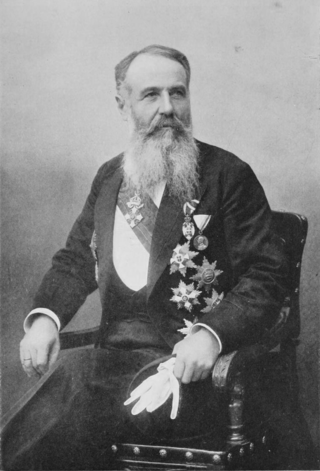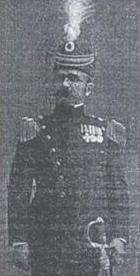Pasić may refer to:
- Pasić, Bosnia and Herzegovina, a village near Tomislavgrad
- Taida Pasić (born 1987), Kosovan refugee
Pasić may refer to:

The Kingdom of Yugoslavia was a state in Southeast and Central Europe that existed from 1918 until 1941. From 1918 to 1929, it was officially called the Kingdom of Serbs, Croats, and Slovenes, but the term "Yugoslavia" was its colloquial name due to its origins. The official name of the state was changed to "Kingdom of Yugoslavia" by King Alexander I on 3 October 1929.

The Corfu Declaration was an agreement between the prime minister of Serbia, Nikola Pašić, and the president of the Yugoslav Committee, Ante Trumbić, concluded on the Greek island of Corfu on 20 July 1917. Its purpose was to establish the method of unifying a future common state of the South Slavs living in Serbia, Montenegro and Austria-Hungary after the First World War. Russia's decision to withdraw diplomatic support for Serbia following the February Revolution, as well as the Yugoslav Committee's sidelining by the trialist reform initiatives launched in Austria-Hungary, motivated both sides to attempt to reach an agreement.

Nikola Pašić was a Serbian and Yugoslav politician and diplomat. During his political career, which spanned almost four decades, he served five times as Prime Minister of Serbia and three times as Prime Minister of Yugoslavia. He played an instrumental role in the founding of Yugoslavia, and is considered one of the most influential figures in Serbian twentieth-century history.

The Mayor of Belgrade is the head of the City of Belgrade. The Mayor acts on behalf of the city, and performs an executive function in the City of Belgrade. The position is important as the city is the most important hub of economy, culture, science and technology in Serbia. The current Mayor of Belgrade is Aleksandar Šapić (SNS). He was elected by the City Assembly on 20 June 2022, following the 2022 City Assembly election.

The assassination of Archduke Franz Ferdinand is considered one of the key events that led to World War I. Archduke Franz Ferdinand of Austria, heir presumptive to the Austro-Hungarian throne, and his wife, Sophie, Duchess of Hohenberg, were assassinated on 28 June 1914 by Bosnian Serb student Gavrilo Princip. They were shot at close range while being driven through Sarajevo, the provincial capital of Bosnia-Herzegovina, formally annexed by Austria-Hungary in 1908.

The Nikola Pašić Square is one of the central town squares and an urban neighborhoods of Belgrade, the capital of Serbia. The square is named after Nikola Pašić who served as mayor of Belgrade, prime minister of Serbia and prime minister of Yugoslavia. Until 1992 the square was named the Square of Marx and Engels.
Ilijas Pašić was a Yugoslav football player and manager.
The People's Radical Party was the dominant ruling party of Kingdom of Serbia and later Kingdom of Serbs, Croats and Slovenes from the late 1880s until 1928.
Parliamentary elections were held in the Kingdom of Serbs, Croats and Slovenes on 8 February 1925. The People's Radical Party remained the largest faction in National Assembly, winning 123 of the 315 seats, with Nikola Pašić remaining Prime Minister.
Pašić is a South Slavic surname derived from Paša. Notable people with the surname include:
Predrag Pašić is a Bosnian retired professional footballer who played as an attacking midfielder or as a forward.
The Yugoslav Democratic Party, State Party of Serbian, Croatian and Slovene Democrats and Democratic Party, also known as the Democratic Union was the name of a series of liberal political parties that existed in succession in the State of Slovenes, Croats and Serbs and the Kingdom of Serbs, Croats and Slovenes.
The Border Post is a comedy-drama produced in international cooperation between the countries of the former Yugoslavia and directed by Rajko Grlić. It was released in 2006.
The Treaty of Niš may refer to:
Pusić is a surname. Notable people with the surname include:

Ljubomir Vulović, known by his nickname Ljuba (Љуба), was an artillery major in the Serbian Army, conspirator of the May Coup, and member of the Black Hand.

After the 1912 Parliamentary Election, a Caretaker Government had to be formed quickly because of the sudden death of the Prime Minister Milovan Milovanović. Marko Trifković of the People's Radical Party was asked to lead it, because Nikola Pašić, the leader of this party was in Russia at the time. On August 29, Trifković was summoned to the Royal Court by King Peter I, who told him that he has accepted the resignation of the cabinet, and that he had entrusted the formation of the new cabinet to Pašić.
The Aluphone is a tuned percussion instrument consisting of aluminum bells that are struck with a mallet to produce musical tones. In its standard configuration, the bells of the Aluphone are mounted on a frame, but it can also be played as a single handheld bell or as a stack of bells. The bells of the Aluphone are very durable, so they can be struck with a large variety of mallets, wands, or hammers depending on the tone that the musician seeks to produce.

Andra Nikolić was a Serbian politician, jurist, writer, literary historian and academic.

The Geneva Declaration, Geneva Agreement, or Geneva Pact was a statement of political agreement on the provisional political system in the future union of the South Slavs living in the territory of the former Austria-Hungary and Serbia. It was agreed by Serbian Prime Minister Nikola Pašić on behalf of Serbia, representatives of Serbian parliamentary opposition, representatives of the National Council of the State of Slovenes, Croats and Serbs which recently seceded from Austria-Hungary, and representatives of the Yugoslav Committee. The talks held in Geneva, Switzerland on 6–9 November 1918 built upon and were intended to supersede the 1917 Corfu Declaration agreed by Pašić and Yugoslav Committee president Ante Trumbić. The basis for the talks was provided by the Greek Prime Minister Eleftherios Venizelos on behalf of the Supreme War Council of the Triple Entente. The talks were necessary in the process of creation of Yugoslavia as a means to demonstrate to the Entente powers that various governments and interests groups could cooperate on the project to establish a viable state.